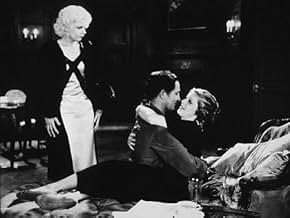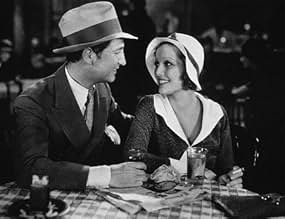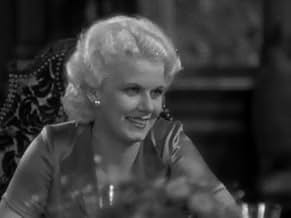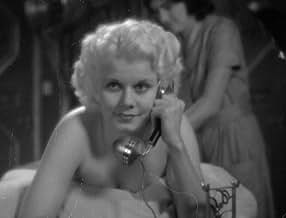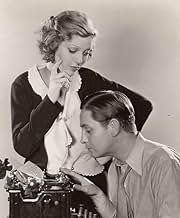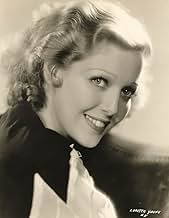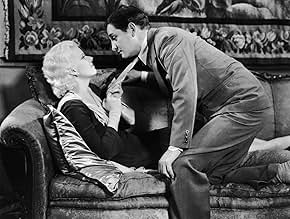AVALIAÇÃO DA IMDb
6,7/10
3,8 mil
SUA AVALIAÇÃO
Adicionar um enredo no seu idiomaA young woman from a very rich family impulsively marries a reporter, but each assumes the other is the one whose lifestyle must change.A young woman from a very rich family impulsively marries a reporter, but each assumes the other is the one whose lifestyle must change.A young woman from a very rich family impulsively marries a reporter, but each assumes the other is the one whose lifestyle must change.
- Direção
- Roteiristas
- Artistas
- Prêmios
- 2 vitórias no total
Don Dillaway
- Michael Schuyler
- (as Donald Dillaway)
Claud Allister
- Dawson - The Valet
- (as Claude Allister)
Wilson Benge
- Butler
- (não creditado)
Vance Carroll
- Reporter
- (não creditado)
Eddy Chandler
- Hank - A Reporter
- (não creditado)
Richard Cramer
- Speakeasy Proprietor
- (não creditado)
Oliver Eckhardt
- Reporter
- (não creditado)
Bill Elliott
- Ann's Beau - The Round-the-World Flyer
- (não creditado)
Adolph Faylauer
- Party Guest
- (não creditado)
J.C. Fowler
- Reporter
- (não creditado)
Avaliações em destaque
Stew Smith is a salt of the earth, street smart, cynical wisecracking reporter who's proud of his $75 a week salary. While tracking a story about a rich kid involved in a breach of promise suit, he gets involved with the Schuylers. This group of nitwits is a super-rich family trying desperately to avoid bad publicity. Stew catches the eye of the gorgeous Ann Schuyler, and the two fall madly in love to the absolute horror of Anne's snooty mother (who unfortunately is afflicted with gastritis). Indeed, Stew and Ann actually get married--with predictably catastrophic results. How will the filmmakers deliver Stew out of Ann's arms and into the arms of Gallagher--the equally gorgeous reporter who's madly in love with Stew?
This wonderful Frank Capra comedy must have appealed greatly to the sentiments of the 1931 audience at the very depths of the Depression. The Schuylers (and their idiot lawyer Dexter Grayson) were everything that people loved to hate--snooty, superior, stupid, wholly undeserving of their vast riches. They are mocked ruthlessly, while Stew Smith and Gallagher, as worthy representatives of the working class, are portrayed with understanding and compassion. Stew briefly embraces the idle life of the super-rich (even to wearing garters), but, of course, this doesn't last long.
This is more than just a film for Frank Capra fans--it's a glorious spoof of the old-time newspaper business and a tasty bit of social history.
This wonderful Frank Capra comedy must have appealed greatly to the sentiments of the 1931 audience at the very depths of the Depression. The Schuylers (and their idiot lawyer Dexter Grayson) were everything that people loved to hate--snooty, superior, stupid, wholly undeserving of their vast riches. They are mocked ruthlessly, while Stew Smith and Gallagher, as worthy representatives of the working class, are portrayed with understanding and compassion. Stew briefly embraces the idle life of the super-rich (even to wearing garters), but, of course, this doesn't last long.
This is more than just a film for Frank Capra fans--it's a glorious spoof of the old-time newspaper business and a tasty bit of social history.
Robert Williams plays the kind of role Spencer Tracy did time and again at Fox and MGM--the brash, likeable working man--and, in fact, the picture suggests a dry run of Tracy's "Libeled Lady." There's a breach-of-promise suit, a roomful of reporters cracking wise, a rich-rich Long Island clan existing to be mocked, and the kind of farcical complications that made the newspaper comedy one of the '30s' most endearing genres. Unfortunately, the dialogue isn't as snappy as it thinks it is, and Jean Harlow is as miscast as a society dame as Loretta Young is as a world-weary reporter -- the whole thing might have made more sense if they switched roles. The compensations, though, are many: Capra giving his actors brilliant bits of business (the "puttering" scene is an unsung classic), a roster of swell character actors, and some pre-Production Code naughtiness, including two very sexy love scenes between Williams and Harlow. Capra's pace is slower than usual, and his later works had cleverer plot twists. His handling of actors, though, is as beautiful to behold as ever. And in Williams' irresistible performance, we have a glimpse of a star that might have been.
I see that I'm in good company here on IMDb in first wondering why on earth I had never heard of Robert Williams before and then in regretting that his career was cut so short after hearing his story.
Williams proves himself to be a winning and engaging comedian in this very funny Frank Capra film about a reporter (Williams) who marries a society dame (Jean Harlow) only to realize that his true love is for the female co-worker (Loretta Young) who's been by his side the whole time. Never mind that Young is one hundred times more feminine and prettier than Harlow -- I just chalk it up to the theory that Harlow had a certain look that was very much in vogue in the 1930s and that made her extremely attractive to people.
I don't think Harlow is at all attractive, but I do see her appeal, and I didn't find her performance to be as bad in this film as the history books have claimed. It's true that the casting should have been reversed, and Young should have played the society belle with Harlow as the working-class girl next door. But never mind. She equips herself pretty well with the material given her, and she manages to be believable in the role.
But in any case, it's neither of the women you'll remember from this movie. It's Williams and his absolutely fantastic way with a funny line. He died of appendicitis at the age of 37, and it's clear that 30s movie audiences lost a potentially major star when they lost him.
Grade: A-
Williams proves himself to be a winning and engaging comedian in this very funny Frank Capra film about a reporter (Williams) who marries a society dame (Jean Harlow) only to realize that his true love is for the female co-worker (Loretta Young) who's been by his side the whole time. Never mind that Young is one hundred times more feminine and prettier than Harlow -- I just chalk it up to the theory that Harlow had a certain look that was very much in vogue in the 1930s and that made her extremely attractive to people.
I don't think Harlow is at all attractive, but I do see her appeal, and I didn't find her performance to be as bad in this film as the history books have claimed. It's true that the casting should have been reversed, and Young should have played the society belle with Harlow as the working-class girl next door. But never mind. She equips herself pretty well with the material given her, and she manages to be believable in the role.
But in any case, it's neither of the women you'll remember from this movie. It's Williams and his absolutely fantastic way with a funny line. He died of appendicitis at the age of 37, and it's clear that 30s movie audiences lost a potentially major star when they lost him.
Grade: A-
Robert Williams doesn't even get any billing n the DVD cover or on other promotions of this film, but he IS the star of the film....and he is outstanding.
Williams could have been a major star, a very well-known actor, had he not died four days after this picture was released with a ruptured appendix. The man simply puts on an acting clinic here. I wonder if young aspiring actors are ever shown this film and told to study Williams? If is wasn't for this film, I assume nobody would ever know about this guy.
Anyway, the movie is really dated but its interesting thanks to some great dialog, mainly, once again, by Williams. Jean Harlow gets the billing but a young Loretta Young has the real beauty and charm here. Too bad her role was so minor and bland. She looked absolutely gorgeous.
The storyline is one of Hollywood's favorite themes: the average Joe beating up on the snobby rich people. Harlow's "mother" in here (Louise Closser Hale) plays that snob role perfectly.
Even though I just gave it six stars, there are lots of laughs in this film and it was a lot better than I thought it would be. Watching Williams' acting performance is worth the price of the disc, and then some.
Williams could have been a major star, a very well-known actor, had he not died four days after this picture was released with a ruptured appendix. The man simply puts on an acting clinic here. I wonder if young aspiring actors are ever shown this film and told to study Williams? If is wasn't for this film, I assume nobody would ever know about this guy.
Anyway, the movie is really dated but its interesting thanks to some great dialog, mainly, once again, by Williams. Jean Harlow gets the billing but a young Loretta Young has the real beauty and charm here. Too bad her role was so minor and bland. She looked absolutely gorgeous.
The storyline is one of Hollywood's favorite themes: the average Joe beating up on the snobby rich people. Harlow's "mother" in here (Louise Closser Hale) plays that snob role perfectly.
Even though I just gave it six stars, there are lots of laughs in this film and it was a lot better than I thought it would be. Watching Williams' acting performance is worth the price of the disc, and then some.
Platinum Blonde launched so many careers - the most infamous being Frank Capra and Jean Harlow. It is not a perfect film by any stretch of the imagination. The sound is bad, Harlow is terribly miscast, and poor Loretta Young struggles valiantly to bring depth to a part that is the filmic equivalent of wallpaper. As many have said before me, she and Harlow would have done well to reverse roles.
But the greatest on screen portrayal of fresh, modern, naturalistic acting (a style that later would be attributed to James Dean) is from the wonderful, refreshingly brilliant young Robert Williams in 1931!!!!! I would never mark this film as a masterpiece, yet I would encourage all struggling male actors to study this man's work as a prime example of how to dominate a scene without any artifice or aggression. Every time he enters a room, the whole film lights up, and every time he leaves, all the other actors seem to lose their purpose and energy.
I have never seen such simple perfection, and I am saddened to no end to learn of his untimely death at thirty-four, just as he was starting to get roles worthy of his genius. I could not get enough of this man's work, and regret having so little of it to view. An absolute must see for Robert Williams alone!
But the greatest on screen portrayal of fresh, modern, naturalistic acting (a style that later would be attributed to James Dean) is from the wonderful, refreshingly brilliant young Robert Williams in 1931!!!!! I would never mark this film as a masterpiece, yet I would encourage all struggling male actors to study this man's work as a prime example of how to dominate a scene without any artifice or aggression. Every time he enters a room, the whole film lights up, and every time he leaves, all the other actors seem to lose their purpose and energy.
I have never seen such simple perfection, and I am saddened to no end to learn of his untimely death at thirty-four, just as he was starting to get roles worthy of his genius. I could not get enough of this man's work, and regret having so little of it to view. An absolute must see for Robert Williams alone!
Você sabia?
- CuriosidadesIn a 2008 interview, actor Christopher Plummer called Williams "...one of the most realistic comedians the screen had. He made Cary Grant look like he was overacting... To watch Robert Williams act was like seeing a comic using the Method, long before the Method became famous with Marlon [Brando] (Marlon Brando) and Monty [Clift] (Montgomery Clift)."
- Erros de gravaçãoWhen they are looking at the front page of "The Tribune Paper", in the headlines, the word "okay" is misspelled. It shows "It's okey with me."
The spelling of "OK" was not standardized for a long time. Writer Dashiell Hammett among others spelled it "okeh" and "oke",
- Citações
Dexter Grayson: Where were you yesterday?
Anne Schuyler: Oh, Stew and I went for a long ride. Dexter, is there any finishing school we could send him to?
Dexter Grayson: Yes - Sing Sing!
- ConexõesEdited into 365 days, also known as a Year (2019)
Principais escolhas
Faça login para avaliar e ver a lista de recomendações personalizadas
- How long is Platinum Blonde?Fornecido pela Alexa
Detalhes
Bilheteria
- Orçamento
- £ 600.000 (estimativa)
- Tempo de duração1 hora 29 minutos
- Cor
Contribua para esta página
Sugerir uma alteração ou adicionar conteúdo ausente

Principal brecha
By what name was Loura e Sedutora (1931) officially released in India in English?
Responda
